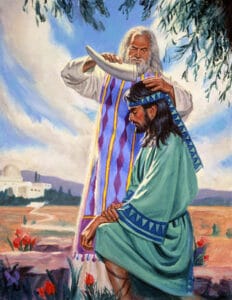Daily Lesson for Tuesday 22nd of April 2025
As originally established, Israel was not to have a human monarch, the way that other nations did. In time, however, the people’s faith faltered, and they found themselves pining for the things that “the nations,” the Gentiles, had.
Read 1 Samuel 8:4-18. Why do you suppose the elders found the idea of a king appealing? In what ways do we fall prey to similar temptations?
It is important to notice that the request for a king was a rejection of God’s reign over His people. As established, the nation was to answer directly to the Creator, and their relationship to Him was put on display through the sanctuary and its services, among other things. By requesting a king, they would bring the same kinds of suffering on themselves that the Gentile kingdoms experienced: military conscription in the king’s wars, confiscation, taxation, and other ills. They would discover that human potentates tend to rule in their own favor instead of benevolently, as God does.
Also, the new arrangement would be permanent: Israel would be given what they asked for, but when they realized that it was a downgrade, they would be stuck with it. “ ‘And you will cry out in that day because of your king whom you have chosen for yourselves, and the Lord will not hear you in that day’ ” (1 Samuel 8:18, NKJV).
God knows the weakness of His people, and He predicted early on that Israel would request a human king. They did, and so much of sacred history is the story of the consequences of that choice.
Read Deuteronomy 17:14-20. Notice that God does not say, “I will give them a king,” but rather, His people decide that they want one. God put safeguards in place to protect His people from some of the evils of human government—though, as the history of the nation and its kings showed, the safeguards often were ignored.
One simply has to look at the history of Israel after they decided to have a king in order to see just how badly things went for them under these kings. Though some kings were better than others, even the “good” ones had done wrong (think of David and Bathsheba). In many cases, the nation lived under the rule of one king after another who did “evil in the sight of the Lord” (see 1 Kings 11:6, 1 Kings 15:26, 1 Kings 16:2,30 King 3:2, etc.).
Back then, or even today, all human governments share one thing in common: sinners governing other sinners. What possibly could go wrong?
 (0)
(0)Source: https://ssnet.org/blog/25b-04-given-what-you-asked-for/




